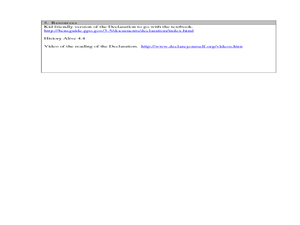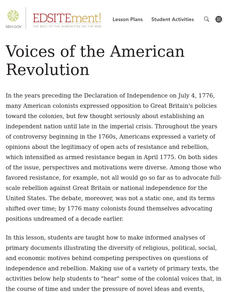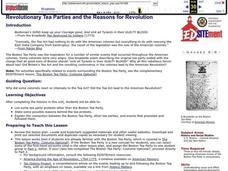Curated OER
Simulation: Revolutionary Town Hall Meeting
Secondary historians simulate events leading up to the American Revolution. They assume the roles of patriots, loyalists, or neutrals in a town meeting set prior to the Revolution. As Patriots and Loyalists make their arguments, neutrals...
Curated OER
Marching to Freedom: PowerPoint Presentation debating for or against going to war
Fourth graders present research on war. In this debate instructional activity, 4th graders create a power point presentation debating for or against the American Revolution. Students share their presentations with the class.
Curated OER
Obstacles to Perseverance
What does it mean to persevere. Young historians review the definition of perseverance then brainstorm a list of obstacles colonists and revolutionaries had to overcome during the American Revolution. Using this list, they identify...
Los Angeles Unified School District
Why Is the Declaration of Independence Important?
Fair or unfair? To begin a study of the American Revolution, class members review the treatment of the people of the American Colonies by the King of England and decide which were fair and which were unfair. Class members then annotate a...
Curated OER
The American Revolution: A War of Principle or Self-Interest?
Students examine the causes of the American Revolution. For this American Revolution lesson, students investigate a list of statements that reveal different perspectives on the causes of the war.
Museum of the American Revolution
Image Analysis: In Their Own Words
Images often convey more than words. Scholars examine political cartoons from the American Revolution to understand how images have the ability to express political ideas. Academics participate in group discussion, complete a worksheet,...
Jamestown-Yorktown Foundation
Why Did Some Colonial Virginians Continue to Support the King?
Not all colonials supported the American Revolution. A resource from the American Revolution Museum at Yorktown ask young historians to investigate the reasons why some colonial Virginians were loyalist and continued to support King...
Roy Rosenzweig Center for History and New Media
The Revolutionary Times as Seen Through the Eyes of Women
The role of women before and during the American Revolution changed dramatically. To gain an understanding of these changes, middle schoolers analyze primary source documents, including letters from women that supported the patriot cause...
Curated OER
Patriots, Traitors, and Spies
Fifth graders determine how Nathan Hale and Benedict Arnold influenced the American Revolution. In this American Revolution lesson, 5th graders research primary and secondary sources to find three character traits of Benedict Arnold and...
Curated OER
Revolutionary War Era Research Project
Young historians interpret historical evidence presented in primary and secondary resources in this American Revolution lesson plan. They select topics from the time era that they are interested in researching. Additionally, they...
Curated OER
The Revolutionary War
March your students off to war with this presentation, which provides details to the American Revolution such as important figures (Jefferson, Franklin, Henry), facts about the Declaration of Independence, and definitions of key terms. A...
Curated OER
Political and Cultural Road to the American Revolution
Learners examine the Declaration of Independence. For this Revolutionary War lesson, students use primary sources to analyze how the creation of the Declaration of Independence lead to the development of the United States as an...
Curated OER
Voices of the American Revolution - Primary Documents
Students use primary documents to examine the attitudes and positions of several factions leading up to the American Revolutionary War. They read documents, debate differing perspectives and write an essay exploring the reasons for revolt.
Jamestown-Yorktown Foundation
Life of a Private Lesson Plan
In order to understand the challenges the Continental Army faced during the American Revolution, class members analyze primary source materials including a soldier's journal and an officer's letter, and watch a short reenactment video.
Curated OER
The Father of Our Country
Explore United States history with this lesson on George Washington and the Revolutionary War. After reading biographical information about George Washington, learners make a list of ten reasons for the revolution. They create a timeline...
University of North Carolina
American Revolution: Events Leading to War
After learning about the growing revolutionary sentiment among colonists, class members work in small groups or pairs to design a political cartoon.
Curated OER
Abigail’s War: The American Revolution through the Eyes of Abigail Adams
Four lessons, performed over four weeks, pay special attention to Abigail Adams. Fifth graders analyze primary and secondary sources, read texts, discuss and write about Adams' experience during the Revolutionary War—the Battle of Bunker...
Curated OER
Tension Between Conflict and Compromise
Learners prepare for and participate in a debate and mock trial regarding laws broken during the Boston Tea Party. Several primary documents and a homework chart are included.
Curated OER
Revolutionary Tea Parties and the Reasons for Revolution
Students identify tea party protests other than the Boston Tea Party, state some possible reasons behind the tea protests, and explain the connection between the Boston Tea Party, other tea parties, and events that preceded and followed...
Curated OER
Writing American Diaries
Young scholars examine the concept of historical perspective in writing. They read the diary of Sally Wister, a young Patriot from Philadelphia during the Revolutionary Era. Additionally, they must include different points of view in...
Curated OER
Jefferson vs. Franklin: Revolutionary Philosophers
Students examine the contributions of Benjamin Franklin and Thomas Jefferson to American Independence. In small groups, they conduct Internet research, read and discuss primary source documents, and complete a chart.
Curated OER
Images of the American Revolution
Students analyze several documents as they research the Revolutionary War. They evaluate documents and examine them for bias and perspective. They use their research to write monologues from the point of view of a famous Revolutionary...
Curated OER
History is a Series of Decisions
Students examine cause and effect. In this American Revolution lesson, students analyze primary source documents regarding the Stamp Act, the Boston Massacre, and George Washington. Students imagine if the events had unfolded differently...
Curated OER
Documents about the Boston Massacre and the Biases of Their Creators
Students compare and contrast writings about pre-American Revolution events. For this political agenda lesson, students conduct research to determine how bias and perspective have made their way into historical documents. Students...























